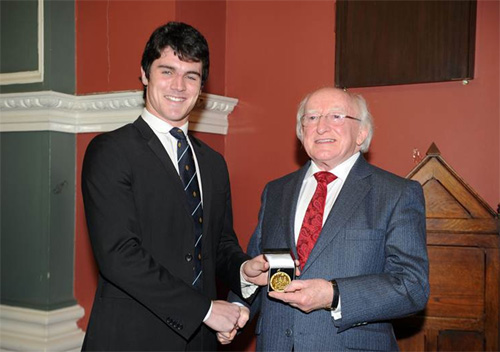Fionn McGorry | Contributing Writer
Being asked to stand at the beginning of a society event is usually considered an anachronism. When it’s the President that you’re being asked to stand for, it’s a little bit different. When the College Historical Society awarded their Gold Medal to President Michael D. Higgins yesterday, the entire room was brought to its feet several times, not merely out of a sense of civic obligation, but out of real affection for the poet, sociologist, and politician that stood before us.
The event opened with Cormac McGuinness, Auditor of the Hist, introducing the President to a packed GMB Chamber, with an audience including the Provost, Dr Patrick Prendergast, Senior Lecturer Patrick Geoghegan, and the President of the Hist, Prof. David McConnell. President Higgins began by thanking McGuinness for his invitation and for the award of the Gold Medal, as well as his predecessor, Hannah McCarthy who initially invited him to address the society on the topic of the role of the Arts in the 21st Century. He referred to several previous visits to the Hist, as a student, and as a speaker at an Inaugural many years ago.
“Don’t waste your life by entering in to something that’s tired and jaded, when the whole world is out there for the taking.”
Higgins’ speech was considered and highly academic, clearly playing to the interested collegiate crowd. His experiences as a poet and as Minister for the Arts, Culture and the Gaeltacht clearly prepared him for discussion on such a topic, however his academic background is what comes across most clearly. He speaks eloquently, in a manner that can’t merely be the work of a speechwriter. The focus of much of what he said throughout the talk and the Q&A was the current economic paradigm and its conflict with creativity. For a President known for his political statements, in many ways he didn’t disappoint, though in other ways we see that he is careful not to offend delicate ears and spoke largely in the abstract rather than dealing with particular policy areas and outcomes. In the Q&A which followed, he clearly showed that his verbosity and eloquence are not restricted to the printed page, managing to refer to theorists, books, articles and anecdotes, in answering each of the questions.
The Questions included discussion on the “selling” of the arts as a policy area, which he dealt with by discussing the concept of the public space, and its diminishing size in recent years. He discussed the impending State Visit to Britain, which he said he was “looking forward to very much”, after a very “warm” encounter with Her Majesty in June last year in Belfast.
While the topics of discussion were clearly important ones, Higgins character and warmth were what lingered. Higgins’ self-deprecation endeared him to the audience. In answering a question on his days as a lecturer, he said his taxing lectures attracted voyeurs, as he lectured on “Sociology of Deviant Behaviour.” When discussing how he would swap with colleagues to give lectures to students outside of his faculty, he ridiculed himself, stating “We eccentrics looked after each other”.
“We eccentrics looked after each other.”
His experiences in University encouraged him to comment on the nature of the University. He expressed a desire, without attempting to get political, for Universities not to be told what to do, rather left to be places of learning. This comment may be a critique of the growing level of specialisation in College courses, advocated by some parties in the state, with courses being directed at particular professions and careers, without giving students scope for the development of other skill areas, and the encouragement of the appreciation of academia more generally.
The President closed the Q&A session with some advice for the students assembled in the Chamber:
“Don’t waste your life by entering in to something that’s tired and jaded, when the whole world is out there for the taking.”
These words, spoken by a veteran politician with a varied and interesting career, are words of experience, and seemed genuinely intended to encourage, rather than to dismiss youthful aspirations as merely immature. It may be that his comment was a veiled critique on the old-order institutions and careers, but that needn’t matter. His comment was one of hope, and, of exasperation, and it is rare that students would be given the opportunity to interact with the president in such an intimate setting, one that both Higgins and the students present seemed to relish.







